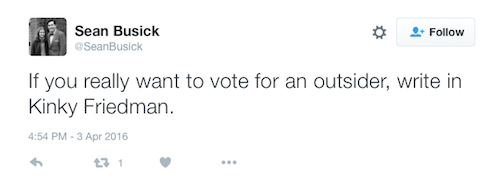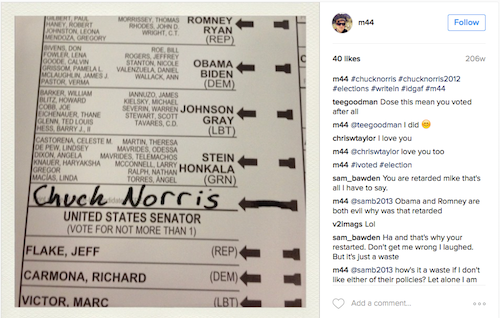It may be legally possible to write in a candidate’s name in the United States where it doesn’t appear on a ballot, but whether or not that vote gets counted is another matter. And as a write-in candidate, trying to win a nomination or democratically elected post in America is about like Don Quixote’s mission to bring back chivalric values — they have virtually no chance.
Generally, it is done as protest against the big names, although the end result might be a spoiler effect. And to some extent, achieving the spoiler effect is to have a say in the eventual outcome
Sometimes starting as a write-in can lead to bigger things. Ralph Nader, for example, waged a write-in campaign in New Hampshire in 1992. Eventually he would go on to serve as spoiler when during the 2000 presidential election, he was was blasted by liberals for taking 97,421 Florida votes. The state’s recount showed Al Gore lost Florida, and thus the U.S. presidency, to George W. Bush by only 574 votes.
Nader’s stated interest in first running as a write-in candidate was “moving politics past the two-party duopoly.” And, to some extent, that statement best describes the move many make to run a write-in campaign — it is a protest of the two main candidates and, by extension, the two main parties.
Here are five things you should know about write-ins:
1. 43 states allow write-in candidates
States not allowing write-ins are Arkansas, Hawaii, Louisiana, Mississippi, Nevada, Oklahoma, South Dakota. Sorry, South Dakota — you cannot vote for Captain Planet.

2. Rules vary by state on how to be an official write-in candidate
For United States presidential candidates, the earliest deadline for write-in filing is Florida in July, but almost all write-in filing deadlines are in October, and a few are in September, while one is in August. On top of all the various deadlines, candidates who choose to wage a write-in candidacy must adhere to some wacky rules on the state level. In Texas, for example, a candidate only needs to signatures of 38 individuals to serve as presidential electors. These “electors” would then cast votes for the person in the Electoral College if they were to win a majority of the popular vote in the state. It’s a shortcut through the 80,778 signatures typically required to make it as a write-in candidate on the ballot. This process saves the secretary of state from having to count votes for, say, Super Mario.
3. A write-in candidate could technically win the presidency
For a history lesson on winners of write-in candidacies, look no further: A number of people who have won major offices after running as a write-in candidates. Way back in 1918, Peter F. Tague beat out John F. Fitzgerald — who apparently did’t have the suave of F. Scott Fitzgerald, who would write the novel that would become “The Great Gatsby”that year in St. Paul, Minnesota. In 1930, Republican Charles F. Curry Jr. was elected to the House after his father had died, and William Knowland served as a senator from California on a write-in candidacy in 1946. Perhaps most famously, Democrat Strom Thurmond was elected in 1954 to become a senator from South Carolina as a write-in candidate after party leaders had blocked him during a polarizing period of southern politics. Write-in candidate Dale Alford was then elected to congress in Arkansas during the 1958 elections. After the incumbent’s untimely death, Republican Joe Skeen was elected as a write-in candidate to Congress in New Mexico in 1980. Then in 2006, Democrat Dave Loebsack won as a write-in candidate after failing to get the required number of signatures. He went on to defeat 15-term incumbent Jim Leach by a razor-thin margin.
4. You could do worse!
As a voter, you can vote for whomever you please. And some people choose to have fun with it.

Take Mad Magazine for example. Their editors satirically called to vote for Alfred E. Neuman as a write-in candidate for every U.S. presidential election from 1960 to 1980 with slogans like “You could do worse–and you already have” and “There are Bigger Idiots running for office!” In the state of Georgia in 2012, a campaign was waged to write in Charles Darwin’s name over congressman Paul Broun, who had no opponent. Broun had called the idea of evolution — and other feats of science — “lies straight from the pit of hell.” Darwin received approximately 4,000 votes.
5. How to cast a write-in ballot
It’s simple. Just write it in!

